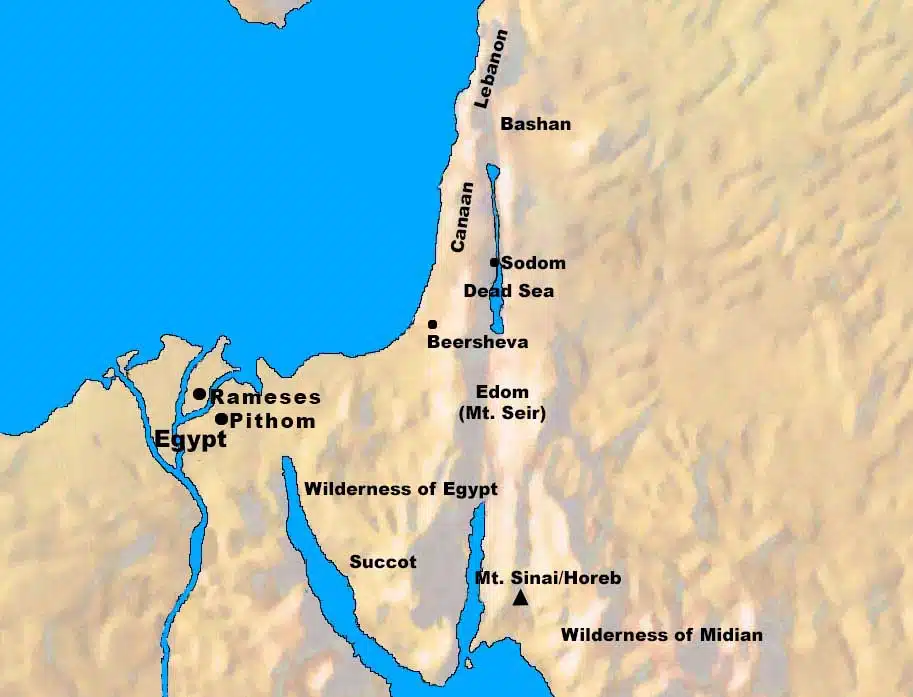In verses 10 – 13, the LORD commanded Moses to confront Pharaoh again to demand the release of the Israelites.
Moses, being discouraged because of the rejection by the Israelites, questioned the LORD concerning his ability to communicate effectively to Pharaoh. If Israel will not listen to him, how could the LORD expect Pharaoh to listen to him? The LORD responded by telling Moses and Aaron to persevere in spite of the rejection.
In verse 6, the LORD commanded Moses to speak to the Israelites with a message that He will deliver them and give them their own homeland. In verse 11, the LORD commanded Moses to go, tell Pharaoh king of Egypt to let the sons of Israel go out of his land. Note again that Moses is to “tell” Pharaoh to let the Israelites go, not ask him permission for them to leave.
Moses, however, continued his objections about being the LORD’s spokesman in verse 12. Here, Moses spoke before the Lord, He tried to reason with the LORD, showing his failure in speaking to the Israelites, Behold, the sons of Israel have not listened to me and then asks Him how then will Pharaoh listen to me? In light of what happened, it seemed like a persuasive argument. How can the LORD expect success when speaking to Pharaoh when Moses speaking to the Israelites was such a failure?
The reason Moses gave for not being qualified as a spokesman is seen in the statement for I am unskilled in speech. This is the same objection Moses used earlier, when the LORD called him in the first place (Ex 4:10). Instead of acknowledging Moses’ question, the Lord spoke to Moses and to Aaron. The LORD again ignored Moses. In a way, the LORD’s lack of response proved Moses’ point. No matter who Moses talked to (the Israelites, Pharaoh, or the LORD), his words fall flat. The LORD might have wanted to impress upon Moses that the deliverance of Israel would not be accomplished because Moses was talented or powerful – it would happen only through the LORD’s sovereign power.
The LORD then gave them a charge to the sons of Israel and to Pharaoh king of Egypt, to bring the sons of Israel out of the land of Egypt. God knew Moses felt inadequate, rejected, and a failure. God’s solution was to command Moses to follow Him anyway. This would indicate that when we experience failure and rejection, the best antidote for the resulting fear and doubt is obedient action.
Biblical Text
10 Now the Lord spoke to Moses, saying, 11 “Go, tell Pharaoh king of Egypt to let the sons of Israel go out of his land.” 12 But Moses spoke before the Lord, saying, “Behold, the sons of Israel have not listened to me; how then will Pharaoh listen to me, for I am unskilled in speech?” 13 Then the Lord spoke to Moses and to Aaron, and gave them a charge to the sons of Israel and to Pharaoh king of Egypt, to bring the sons of Israel out of the land of Egypt.
Check out our other commentaries:
-
Exodus 28:36-39 meaning
The LORD describes the golden plate. It was to adorn the turban and be worn on the High Priest’s head. ...... -
Deuteronomy 34:4-8 meaning
Having viewed the Promised Land from the top of Mount Nebo, Moses died there in the land of Moab. The LORD Himself buried him in...... -
Amos 4:6-11 meaning
Amos spells out several calamities that the LORD sent to Israel to catch their attention so that they might return to Him. But all this...... -
Exodus 3:7-10 meaning
God tells Moses that He is aware of the plight of the Israelites and tells Moses that He is sending him to Pharaoh. ...... -
Genesis 18:6-8 meaning
Abraham, the good host, quickly asks Sarah to prepare bread and asks a servant to prepare a calf to eat. He then brought his guests......



